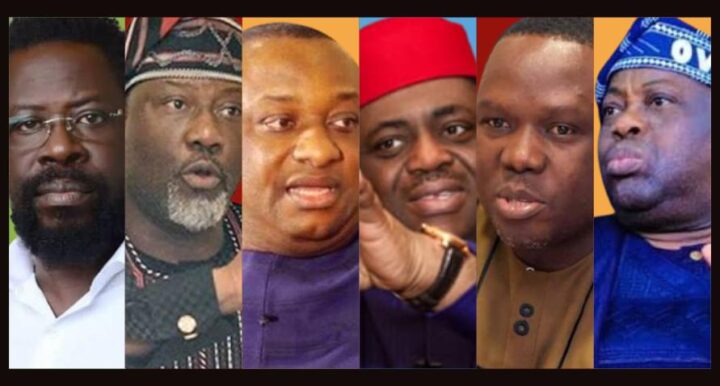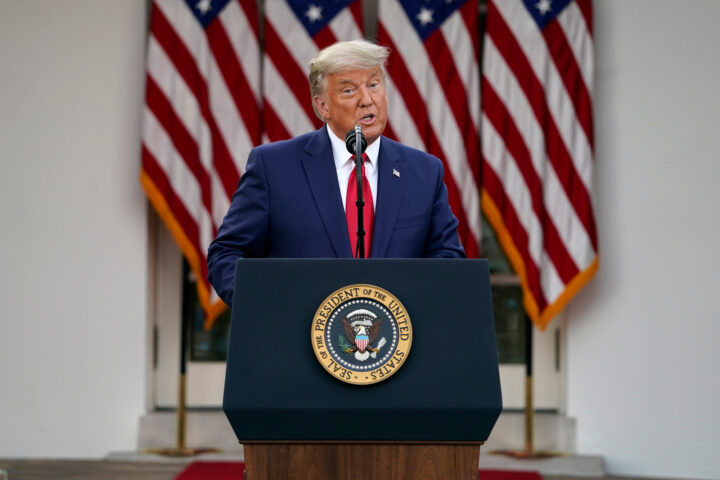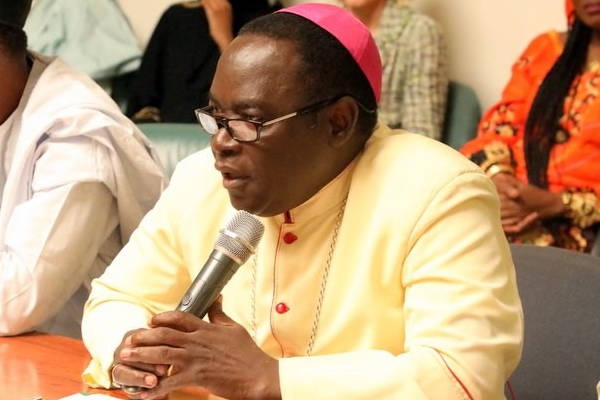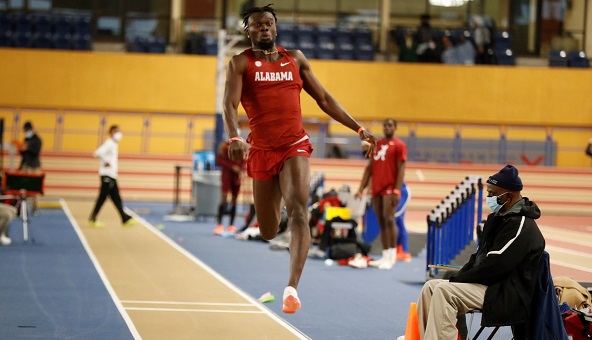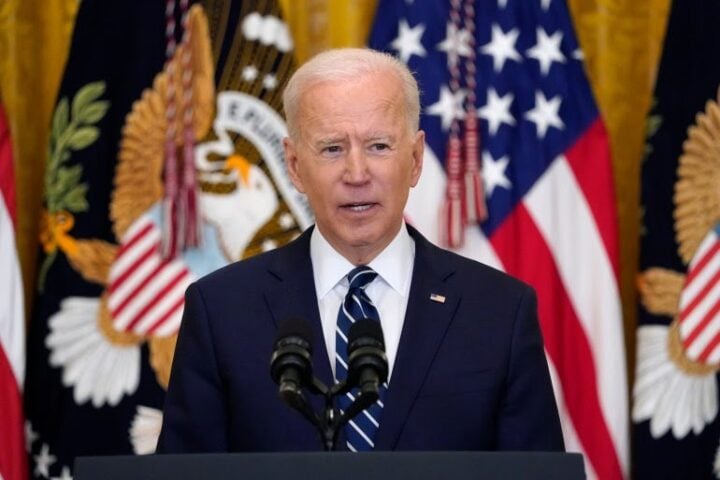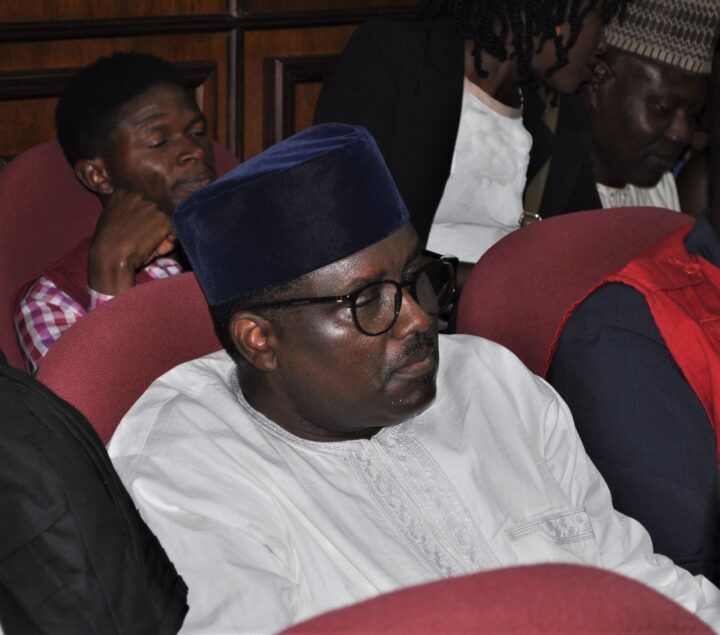Ahead of the 2023 elections, it’s a jungle out there!
From personal attacks to tit-for-tat jabs to unverifiable claims and disinformation, campaign spokespersons have been increasingly vociferous in their bids to champion the cause of their principals.
Festus Keyamo, Daniel Bwala, Dele Momodu, and Femi Fani-Kayode are some of the presidential spokespersons leading this charge.
While it was always expected that there would be “fireworks”, many did not anticipate that the campaign season would be this heated.
Advertisement
Critics have argued that since the return to democratic rule in 1999, the country’s nascent democracy should have grown beyond insignificant tirades by politicians and their spokespersons.
A paper published in the University of Oxford, titled ‘Troops, Trolls and Troublemakers: A Global Inventory of Organized Social Media Manipulation’, revealed that political parties or candidates use social media to manipulate public opinion during a campaign, either by purposefully spreading fake news or disinformation or by trolling or targeting any support for the opposition party.
Citing harassment as part of individual targeting – a strategy used by trolls — the paper said it involves the use of verbal abuse, hate speech, discrimination and trolling against the values, beliefs or identity of a user or a group of users online.
Advertisement
In this report, TheCable chronicles cases where campaign spokespersons have opted to attack the personalities of their opponents, rather than selling their candidates based on what they have to offer.
FEMI FANI-KAYODE
Femi Fani-Kayode, director of public engagements and media operations of the Tinubu/Shettima presidential campaign council, has often relied on insults and personal attacks in the ongoing election campaign.
The former minister of aviation has a combined followership of 1.9 million on Facebook and Twitter.
Advertisement
Disinforming his audience with an unverified report, Fani-Kayode once said Atiku Abubakar, the presidential candidate of the Peoples Democratic Party, travelled with his allies to Dubai to seek medical help for his failing health – a claim he couldn’t prove and was later denied by the opposition party.
He didn’t stop there, he described Atiku’s allies as “clowns, court jesters, scum bags and bush men”, who went to “drink coffee with their boyfriends and girlfriends in Paris”.
There is more. The former minister of aviation cooked up another unverified story about the recent trip of the PDP presidential candidate and his entourage to the US.
He first described them as “internationally displaced politicians (IDP)” before sharing an unverifiable short story on how a personal assistant to the US secretary of state said, “his boss had no time to meet a failed and treacherous former VP”.
Advertisement
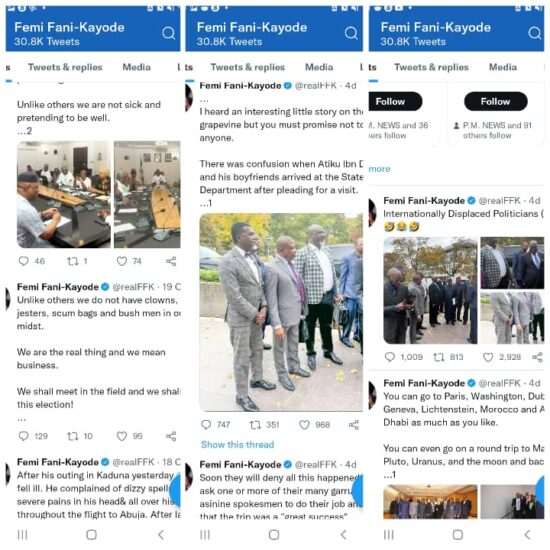
On Peter Obi, the presidential candidate of the Labour Party, the APC campaign spokesperson described him as a “mannerless dunce with low self-esteem”, adding that the former governor of Anambra is a “charlatan and a modern-day walking disaster”.
Advertisement
During his visit to Lagos on October 30, Fani-Kayode described Olajide Adediran, the governorship candidate of the Peoples Democratic Party (PDP) in the state, as “seriously ill and/or mentally challenged” if he thinks he can defeat Babajide Sanwo-Olu, the incumbent governor, in the 2023 election.
Fani-Kayode, a lawyer by profession, operates more with jibes at political opponents, while rarely dealing with issues and policies even after Bola Tinubu, the presidential candidate of the APC, released an 80-page policy document.
Advertisement
He recently described Dino Melaye, a former Nigerian senator, as a “butt-loving, rectum-sucking, skin-bleaching tout”.
Meanwhile, a day before the election campaign kicked off, President Muhammadu Buhari had appealed to “contestants and their media representatives to commit to issue-based campaigns and avoid insults and personal attacks”.
Advertisement
But it appears the president’s pleas fell on deaf ears.
Albertina Piterbarg, an electoral expert at UNESCO, while discussing the impact of harmful online practices on the electoral cycle, said disinformation may become a way of political propaganda.
She said through disinformation, misinformation and hate speech, vulnerable groups might be targeted during elections in order to fuel intolerance and social polarisation.
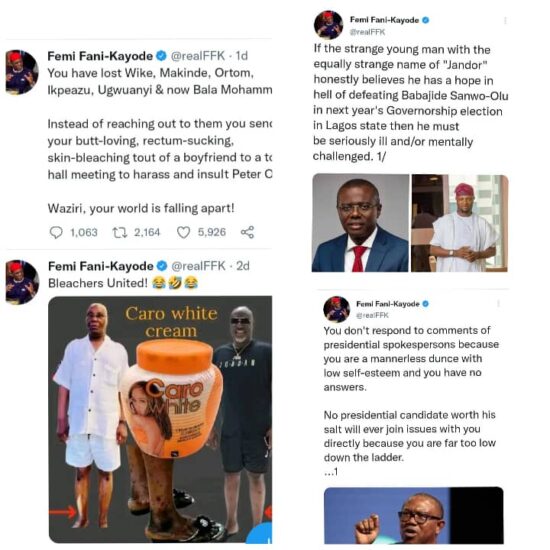
DANIEL BWALA
Daniel Bwala, a spokesperson of the Atiku Abubakar presidential campaign council, has also been found using expletives.
The former APC chieftain, who has gained some notoriety on social media, once described Festus Keyamo, the spokesperson of Tinubu/Shettima PCC, as a “frog smoked out of a hole”.
He called Fani-Kayode a “fallen angel” whose only use is for “a nuisance value”.
In a means to portray the APC as a party neck-deep in crisis, Bwala put out an unconfirmed report, wherein he claimed that Vice-President Yemi Osinbajo and Boss Mustapha, the secretary to the federal government, had rejected “the Muslim/Muslim ticket by asking to be left out of the campaign council”.
Meanwhile, the APC campaign had said the omission of Osinbajo from the campaign list was done at the instruction of President Muhammadu Buhari.
Also reacting to the heightened buzz in the camp of Peter Obi, the presidential candidate of the Labour Party, who has been enjoying growing support from Nigerian youths, Bwala said the former governor of Anambra is “basking in the euphoria of social media hallucinations”.
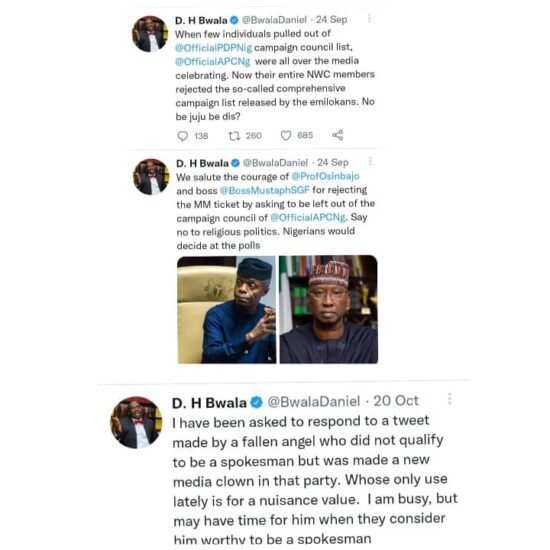
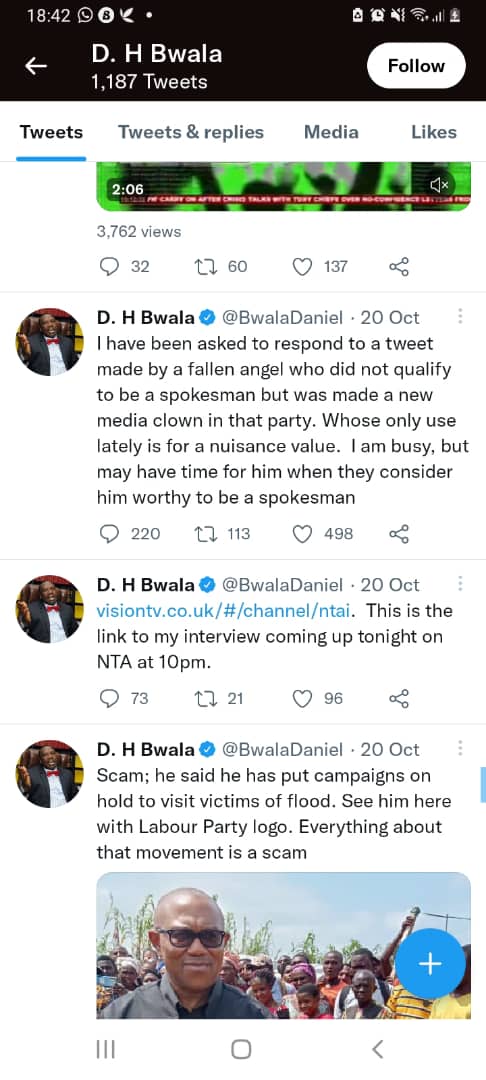
FESTUS KEYAMO
On October 24, Festus Keyamo called Dele Momodu, another spokesperson for the Atiku Abubakar PCC, “a praise-singer dabbling in the demanding job of critiquing policy statements”.
He said the publisher of Ovation was “huffing and puffing without substance”, describing him and his team as a group of “photographers and video editors with tabloid-centred minds”.
Responding, Momodu labelled Keyamo a “certified nuisance and political neophyte” who is trying so hard to be Bola Tinubu’s “lap dog”.
DINO MELAYE
Dino Melaye, another spokesperson of the Atiku PCC, branded Kashim Shettima, the running mate of Bola Tinubu, as the “grand commander of bandits (GCOB)” without any evidence to back his claim.
In a two-part video posted on his Twitter account, he described the APC as a “satanic party that has created disunity like never before in the history of the country”. Again, Melaye, a former senator, failed to attribute his claim to any verifiable data.
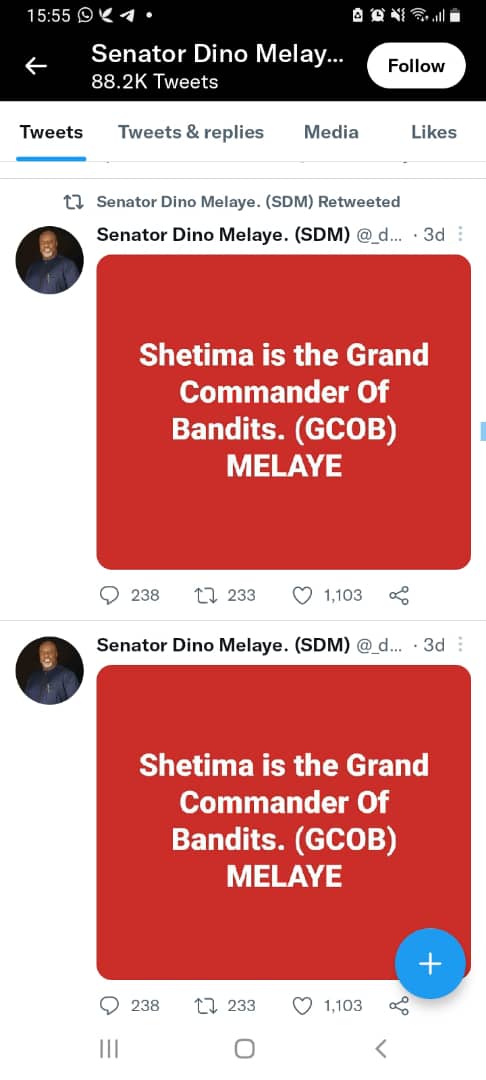
DELE FAROTIMI
A social media user’s wish to see Dele Farotimi, a spokesperson of the Obi/Datti presidential campaign, debate Ajuri Ngelale, a spokesperson of the Tinubu/Shettima campaign, elicited an unsavoury response from the human rights lawyer.
He said: “Anyone requiring a debate between myself and that Aba Made Oyinbo before deciding on how to vote in the coming elections has to be either foolish or intellectually indolent.”
The spokesperson, who has been at the forefront of clamouring for a new government, uses words like “idiots, foolish, stupid, nincompoop, mentally incapable” to attack whoever dares to oppose his political views, especially as related to the presidency.
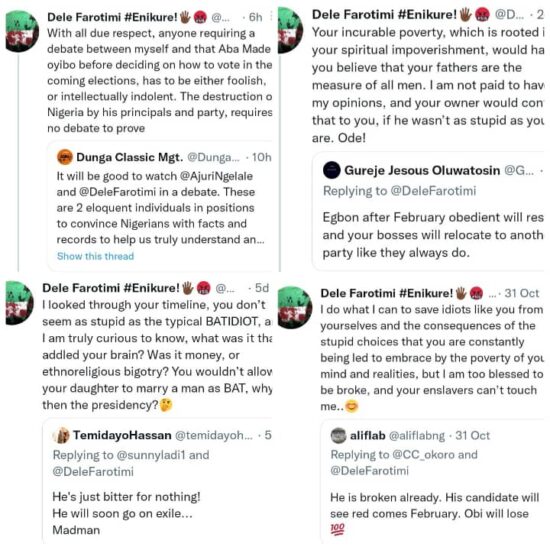
‘THEY’RE MEANT TO INTERROGATE MANIFESTOS’
Examining the causes and effects of the actions of the campaign spokespersons, Daniel Ekerafo, a senior lecturer at the department of mass communication, University of Benin, said they are supposed to interrogate manifestos of their opponents rather than attacking personalities.
He said weaponising insults, personal attacks and disinformation may trigger aggressive and violent behaviours, adding that the electorate may also be misinformed to the extent of voting on pedestrian issues.
“Campaign spokesmen ought to interrogate the manifestos of their opponents by picking holes in them rather than attacking the personalities of the individuals,” he said.
“Mudslinging is an attempt by a political party or a spokesperson to rub mud on his opponents to paint a picture that this person is dirty. So that is the major reason they use personality attacks.
“The effect is that it can stimulate aggressive behaviour in the supporters of both parties. It can stimulate violence. Number 2, It would take away the core issue of the campaign from issues to personalities.
“And if the electorates are not well-informed, the implication is that they will vote on very pedestrian issues rather than voting on the competence of someone who can offer solutions to our problems.”
With just over two months to the 2023 elections, it remains to be seen how worse things would get — or if there’d be a turnaround.
Add a comment

